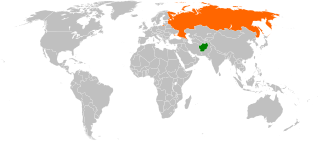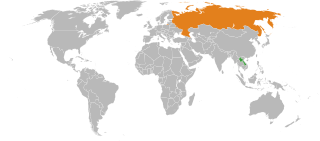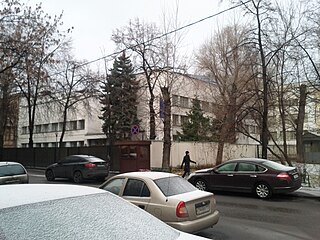The Republic of Estonia gained its independence from the Russian Empire on 24 February 1918 and established diplomatic relations with many countries via membership of the League of Nations. The forcible incorporation of Estonia into the Soviet Union in 1940 was not generally recognised by the international community and the Estonian diplomatic service continued to operate in some countries. Following the restoration of independence from the Soviet Union, Russia was one of the first nations to re-recognize Estonia's independence. Estonia's immediate priority after regaining its independence was the withdrawal of Russian forces from Estonian territory. In August 1994, this was completed. However, relations with Moscow have remained strained primarily because Russia decided not to ratify the border treaty it had signed with Estonia in 1999.

The foreign relations of Laos, internationally designated by its official name as the Lao People's Democratic Republic, after the takeover by the Pathet Lao in December 1975, were characterized by a hostile posture toward the West, with the government of the Lao People's Democratic Republic aligning itself with the Soviet bloc, maintaining close ties with the Soviet Union and depending heavily on the Soviets for most of its foreign assistance. Laos also maintained a "special relationship" with Vietnam and formalized a 1977 treaty of friendship and cooperation that created tensions with China.

After achieving independence from the Soviet Union, the Republic of Moldova established relations with other European countries. A course for European Union integration and neutrality define the country's foreign policy guidelines.

State continuity of the Baltic states describes the continuity of the Baltic states as legal entities under international law while under Soviet rule and German occupation from 1940 to 1991. The prevailing opinion accepts the Baltic thesis of illegal occupation and the actions of the USSR are regarded as contrary to international law in general and to the bilateral treaties between the USSR and the Baltic states in particular.

China and Zimbabwe have had a close, but chequered, relationship since the latter's independence.

Mexico–Russia relations refers to the diplomatic relations between the United Mexican States and the Russian Federation. Both nations are members of the Asia-Pacific Economic Cooperation, G-20 major economies and the United Nations.

Relations between Afghanistan and Russia first emerged in the 19th century. At the time they were placed in the context of "The Great Game", Russian–British confrontations over Afghanistan from 1840 to 1907. The Soviet Union was the first country to establish diplomatic relations with Afghanistan following the Third Anglo-Afghan War in 1919. On 28 February 1921, Afghanistan and Soviet Russia signed a Friendship Treaty. The Soviet Union intervened in Afghanistan against the Basmachi movement in 1929 and 1930.

Ethiopia–Russia relations is the relationship between the two countries, Ethiopia and Russia. Both countries established diplomatic relations on April 21, 1943. Russia currently has an embassy in Addis Ababa, and Ethiopia has an embassy in Moscow. The Ethiopian ambassador to Russia is also accredited to Armenia, Azerbaijan, Belarus, Georgia, Kazakhstan, Kyrgyzstan, Moldova, Tajikistan, Turkmenistan, Ukraine, and Uzbekistan.

The establishment of diplomatic relations between Albania and the Soviet Union happened on April 7, 1924. Both countries were also allies in the Warsaw Pact. Albania has an embassy in Moscow. Russia has an embassy in Tirana.

Laos–Russia relations refers to the current and historical relationship between Lao People's Democratic Republic and the Russian Federation. On 31 December 1991, Laos recognised the Russian Federation as the successor state to the Soviet Union, after the latter's dissolution. Laos has an embassy in Moscow, while Russia has an embassy in Vientiane.

The Ministry of Foreign Affairs is the Kazakh government ministry which oversees the foreign relations of Kazakhstan.

Russia–Trinidad and Tobago relations are the bilateral relations between the Russian Federation and Trinidad and Tobago. Diplomatic relations were established on June 6, 1974. Russia is represented in Trinidad and Tobago through a non-resident embassy in Georgetown, Guyana.

The Kingdom of Tonga and the Union of Soviet Socialist Republics established formal diplomatic relations in 1976. Tonga was the first Pacific Island country to establish relations with the USSR. The USSR was dissolved in 1991 and was succeeded by the Russian Federation as the successor state.

Russia–Zambia relations is the bilateral relationship between Russia and Zambia.

Russia – Zimbabwe relations date back to January 1979, during the Rhodesian Bush War. The Soviet Union supported Joshua Nkomo's Zimbabwe African People's Union, and supplied them with arms; Robert Mugabe's attempts to gain Soviet support for his Zimbabwe African National Union were rebuffed, leading him to enter into relations with Soviet rival Beijing. After the end of the white regime in Zimbabwe, Robert Mugabe had strengthened his relations with both Beijing and Moscow as a result of intense western pressure on him. The USSR soon established diplomatic relations with Zimbabwe on February 18, 1981 and Russia still maintains an embassy in Harare. Both Russia and China still maintain strong economic and political ties with Zimbabwe and both countries had vetoed the UN resolution imposing UN sanctions on Zimbabwe which was proposed by both the US and the UK on July 12, 2008.

Nepal–Russia relations is the bilateral relationship between Russia and Nepal.

Guyana–Russia relations is the bilateral foreign relations between the Russian Federation and Guyana. Officially established in 1970, Russia has an embassy in Georgetown, and Guyana's ambassador to Russia resides in London.

The Embassy of the Philippines in Moscow is the diplomatic mission of the Republic of the Philippines to the Russian Federation. Occupied since 1978, it is located on 6/8 Karmanitskiy Lane in the Arbat District of central Moscow, a short walk from the headquarters of the Russian Ministry of Foreign Affairs, and near the former home of Alexander Pushkin and the residence of the Ambassador of the United States to Russia.



















